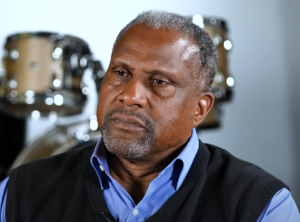In recent years, there has been a noticeable shift in public support from some prominent Black celebrities towards Donald Trump. Figures like former NFL star Antonio Brown, boxing promoter Don King, rappers Kodak Black, Lil Wayne, and Kanye West have openly expressed their support for Trump. Despite this trend, many people in the Black community still view this development as more of a spectacle than a significant political change.
This variety of viewpoints emphasizes the fact that Black Americans are not a monolithic group, with different individuals holding diverse perspectives on politics and social issues. Some view these celebrities’ actions as acts of betrayal, comparing them to Judas, who betrayed Jesus, emphasizing that within any group, there will be individuals who go against the collective sentiment.

Tavis Smiley’s Reflection on Black Leadership and Betrayal
Tavis Smiley, a prominent public figure, uses the example of Jesus Christ’s twelve disciples to explain the diversity of perspectives among Black Americans. He highlights that even within a group personally selected by Jesus, there were those who betrayed him or faltered in their loyalty. By comparing this to current political support for Trump among certain Black celebrities, Smiley suggests that it should come as no surprise that not all Black Americans will align with mainstream political views. Some, like the celebrities mentioned earlier, may choose to align themselves with figures like Trump, even if that stance contradicts the broader sentiment within the Black community.
The Lasting Impact of Supreme Court Appointments
A key concern Smiley raises is the long-term impact of voting decisions, particularly with regard to the appointment of Supreme Court justices. He stresses that voters need to think beyond the four-year term of a president and consider the implications of who is appointed to the highest court in the land. During Trump’s presidency, he appointed three justices—Neil Gorsuch, Brett Kavanaugh, and Amy Coney Barrett—cementing a conservative majority on the court that could shape the legal landscape for decades.
With Clarence Thomas, who was appointed by George H.W. Bush, still serving, Smiley emphasizes that these appointments have long-lasting effects that could shape the lives of future generations. He urges voters to think about the broader implications of their choices and how they will impact not just their own lives but also the lives of their children and grandchildren.
Policing in Black Communities
Another critical issue discussed is the state of policing in Black communities. The recent tragic deaths of Black individuals at the hands of police officers have reignited debates about police accountability and reform. Smiley, who co-authored The Covenant with Black America, reflects on the ongoing struggles Black Americans face with law enforcement. The book, which focuses on key issues affecting the Black community, includes an essay by Dr. Molina Abdullah, a leader in the Black Lives Matter movement. In her essay, Abdullah argues that police are not necessary and should be replaced by resources that address the underlying issues in communities.
While Smiley disagrees with Abdullah’s stance on completely removing police from Black communities, he acknowledges that there are certain roles police should not play, especially in situations where individuals need help rather than law enforcement intervention. The death of Sonia Massie, a Black woman shot by police in her home, highlights this issue. Smiley contends that the police should not have been involved in that situation, as their presence often escalates matters rather than resolving them peacefully.
Homelessness in the Black Community
In addition to policing, Smiley draws attention to another pressing issue: homelessness. Black Americans are increasingly becoming the face of homelessness in the U.S. In the 2023 point-in-time count, 654,000 people were recorded as homeless, with a significant portion of them being Black. Smiley adds a new “Covenant” to his book, The Covenant with Black America—20 Years Later, focusing on the “Urgency of Now” regarding homelessness. He emphasizes that the Black community must address this growing crisis, as it is an issue that affects individuals from California to the Carolinas.
The Need for a Broader Conversation on Black Issues
Throughout his discussion, Smiley stresses the importance of having a robust debate about the issues facing Black Americans. He believes that progress can only be made when these matters are openly discussed and addressed. Whether it is the debate over police reform, the long-term impact of Supreme Court appointments, or the growing crisis of homelessness, Smiley urges the Black community to come together and engage in these important conversations. Only by doing so, he argues, can meaningful change be achieved for future generations.


